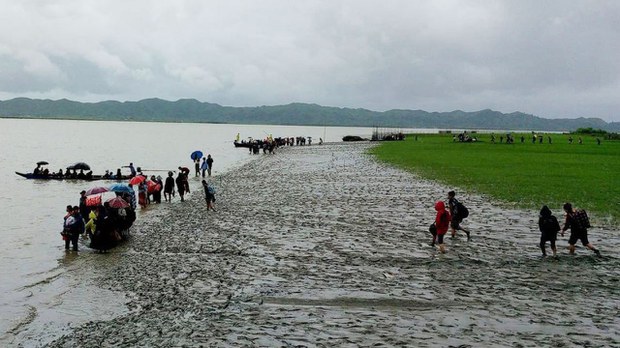An intensification of fighting between ethnic Arakan Army fighters and junta troops in western Myanmar’s Rakhine state has caused tens of thousands of villagers to flee four major townships in anticipation of additional clashes, residents said Friday.
The fighting follows a Nov. 13 attack by the Arakan Army, or AA, on two junta police outposts which broke a ceasefire between the two sides that had been in place since November 2022.
Military forces are now shelling towns in the state with heavy artillery before taking up positions and arresting inhabitants, said sources in the region who, like others interviewed for this report, spoke to RFA Burmese on condition of anonymity citing security concerns.
Ahead of the arrival of junta troops, residents of Pauktaw, Sittwe, Ponnagyun and Minbya – townships with a combined population of around 150,000 – are fleeing in droves, they said.
“More than 99% of people have fled their homes, leaving less than 1% in town,” said a resident of Minbya. “Many houses are now empty as they fear that the junta will attack the town.”
On Nov. 24, a military vessel on the Kaladan River fired artillery on Ponnagyun, setting the township’s main market ablaze, one resident told RFA. Since then, nearly everyone has packed up and left, he added.
“We don’t feel safe in town – we were attacked with heavy weapons and the market was set on fire,” the resident said. “People are concerned about their safety. Only one-tenth of the population remains in the town. Most have fled to safer areas.”
Fighting in Pauktaw township has intensified since Nov. 16, when the Arakan Army, or AA, seized control of a junta police station, residents said. Houses have been destroyed in fires started by military shelling and junta troops are taking up positions on the top floors of the township’s tallest buildings, they said.
And while the capital Sittwe has yet to become the site of clashes between the junta and the AA, the military recently fired artillery on the town and arrested civilians on suspicion of ties to the ethnic army, one resident said.
“The military shelled the town and arrested people, so they became afraid and fled to other areas,” he said.
Those who remain are unable to leave their homes during a strict nightly curfew from 9 p.m. to 6 a.m., and are living in fear of the junta troops, he added.
Military blames AA
Calls by RFA to junta Deputy Information Minister Major-General Zaw Min Tun for comment on the civilian exodus went unanswered Friday. However, on Nov. 27 the junta spokesman told state media that the “AA forced residents of Pauktaw and Ponnagyun townships to flee their homes.”
RFA inquired to AA spokesman Khaing Thu Kha about the junta’s claims, but received no response as of the time of publishing.

But Pe Than, a veteran ethnic Rakhine politician and former lawmaker, confirmed to RFA that residents had fled from the military.
“The junta troops have brutally attacked civilians in towns and villages, using artillery attacks to destroy their livelihoods,” he said. “Such attacks took place in Pauktaw to preempt AA control, so people had no option but to flee their homes and take shelter in remote areas.”
According to population data released by the Ministry of Union Government Office in 2019, Pauktaw township is home to nearly 20,000, Ponnagyun township to more than 10,000, Minbya to more than 20,000, and Sittwe to more than 100,000.
Sources said that while nearly the entire populations of Pauktaw, Ponnagyun and Minbya have fled, only some in Sittwe have left their homes. RFA could not independently verify the number of people displaced from the four townships.
Since the end of the year-long ceasefire in Rakhine state, at least 17 civilians have been killed and some 70 injured, according to RFA reporting.
Widening displacement
Reports of residents fleeing their homes in Rakhine state came as the United Nations Office for the Coordination of Humanitarian Affairs, or UNOCHA, said that some 500,000 people have been displaced from their homes in Myanmar since the end of October, amid an intensification of clashes between junta troops and the armed resistance in recent months.
On Oct. 27, the “Three Brotherhood” Alliance of the AA, the Myanmar National Democratic Alliance Army, or MNDAA, and the Ta’ang National Liberation Army, or TNLA, launched an offensive against the military in northern Shan state dubbed “Operation 1027.”
The rebels say they have made notable gains against the military in several key cities in Shan and claim to have captured more than 170 military outposts since the start of the campaign.
But the intensification of fighting has caught civilians in the crossfire, contributing to the huge increase in displaced communities nationwide. The 500,000 newly displaced across the country since the end of October adds to the 2 million displaced by fighting before the current escalation began, according to the UNOCHA – some three-quarters of whom have fled their homes since the military seized power in a Feb. 1, 2021, coup d’etat.

In its flash update on Friday, the U.N. said that an estimated 50,000 people have been displaced in northern Shan’s Laukkaing township, along the border with China, since the start of Operation 1027, and “have only been able to receive minimal assistance” from aid groups.
Meanwhile, key transport routes in townships experiencing active fighting throughout the country have been blocked by both the military and the armed resistance, “restricting people’s movements to safer locations and hampering humanitarian access,” it said.
The UNOCHA called for an urgent injection of funding to enable aid groups to respond to the growing humanitarian crisis.







